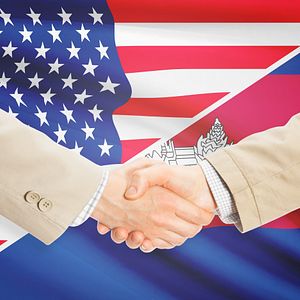The United States and Cambodia should look to strengthen their relationship even in the face of differences and challenges, the youngest son of the country’s premier Hun Sen with aspirations to hold the Southeast Asian state’s highest office told an audience in Washington, D.C. January 20.
Good momentum has been built up in U.S.-Cambodia relations over the past few years, Hun Many, a lawmaker from the ruling Cambodian People’s Party (CPP) with a stated ambition to become the country’s next prime minister, said in a speech at the Johns Hopkins School of Advanced International Studies (SAIS) Wednesday. Both sides have seen a string of high-level visits, with U.S. President Barack Obama visiting Cambodia in 2012 for the East Asia Summit and even Michelle Obama doing so last year. U.S. Secretary of State John Kerry is scheduled to make a trip to Cambodia later this month, and Hun Sen will be in the United States in mid-February for the U.S.-ASEAN Leaders Meeting at the Sunnylands estate in California (See: “A ‘Special’ US-ASEAN Summit in Sunnylands in 2016?”).
More generally, the 33-year old Hun Many, who has spent several years studying in the United States at Hoffstra University and the National Defense University, argued that there was already a good foundation to build on between the two countries. Trade-wise, Cambodian exports to the United States were valued at $2.8 billion last year while U.S. exports to Cambodia were at $363.4 million. Over 200,000 Americans visited Cambodia in 2015, and collaboration was ongoing in several areas including defense and counterterrorism.
“So we have room for enhancing and betterment of our relations,” he said. “And frankly, for me, I believe there [are] good prospect[s] for an even better U.S.-Cambodia relationship.”
Though he admitted that there were differences between the two sides, particularly on democracy and human rights, he repeatedly said that such concerns needed to be viewed alongside the country’s current successes and future prospects. Asked about how Cambodia’s ruling elite, including his father, could move the country forward while trampling on basic rights – such as through the beating of opposition lawmakers last year – Hun Many acknowledged that the incident had occurred but chose instead to focus on what that said about Cambodian society and the country more generally instead of the ruling party itself.
“Yes I do understand. Yes that happened. But can you actually take that and say that Cambodian society…approve[s] of that?” he asked rhetorically. “I will not be shy about the negative aspect. Things are happening. But do you really think that Cambodia is that bad?”
Despite these differences, he encouraged both Cambodia and the United States to look beyond them to realize greater bilateral cooperation in the future.
“Again, Cambodia not only defined [by] democracy and human rights,” he argued. “We have so many platforms for good collaboration. We should not dwell only on the challenge or the difference. We should build up on the good relation[s] while also addressing the challenge,” he said.
One important area ripe for even more cooperation, he suggested, was terrorism. While he applauded the Indonesian government for its efforts to counter extremism since the September 11 attacks in 2001, he said that the recent Jakarta bombings had “reignited” concerns and highlighted the need for more collaboration on that front (See: “Islamic State Attack in Indonesia? A Look at the 2016 Jakarta Bombings”). Cambodia, he suggested, could also play a role.
“I’m not an expert on it, but Hambali was caught when crossing from Cambodia going to Thailand because of intelligence cooperation based on counterterrorism,” he said, referring to a key leader of the al-Qaeda linked Jemaah Islamiyah who was netted in August 2003 in the Thai province of Ayutthaya following a tip-off from Cambodian police.
Hun Many’s visit to the United States, which he described as meant primarily to “listen” to the views of others rather than promoting a particular agenda, nonetheless comes at an interesting time in U.S.-Cambodia relations. According to the U.S. State Department, Kerry’s visit to Phnom Penh on January 26 will include meetings with Hun Sen and Foreign Minister Hor Namhong, with part of the discussions focused on seeking ways to further strengthen bilateral cooperation and the growing economic relationship. Those deliberations will occur weeks before the U.S.-ASEAN Summit scheduled for February 15-16 which Hun Sen will attend.
Ahead of the U.S.-ASEAN Summit, Human Rights Watch drafted a letter to Obama imploring him to make human rights a central focus of the meeting, especially given the presence of several Southeast Asian authoritarian leaders such as Hun Sen.
“One of the ASEAN leaders, Prime Minister Hun Sen of Cambodia, has ruled over Cambodia for more than 30 years, using violence, intimidation, and politically motivated arrests and prosecutions against all perceived opponents, while allowing high-level corruption and cronyism to flourish,” HRW said in a statement released January 19.
Asked about his ambitions to become prime minister, which he spoke about in a broadcast of Vayo Radio last month, he stressed that he believed the country’s youth – not only himself – ought to aspire to the highest honor to serve the people and the country.
“What is wrong in being able to…have a dream of receiving such an honor?” he said. “That’s why I said to all Cambodians…should have a dream of becoming prime minister.”
“Becoming prime minister is my intention as well as [the intention] of other people,” he had said during that broadcast.
His comments had sparked interest among observers who have long believed that Hun Sen, a strongman who has ruled Cambodia for over three decades, is grooming his sons to succeed him in office.

































